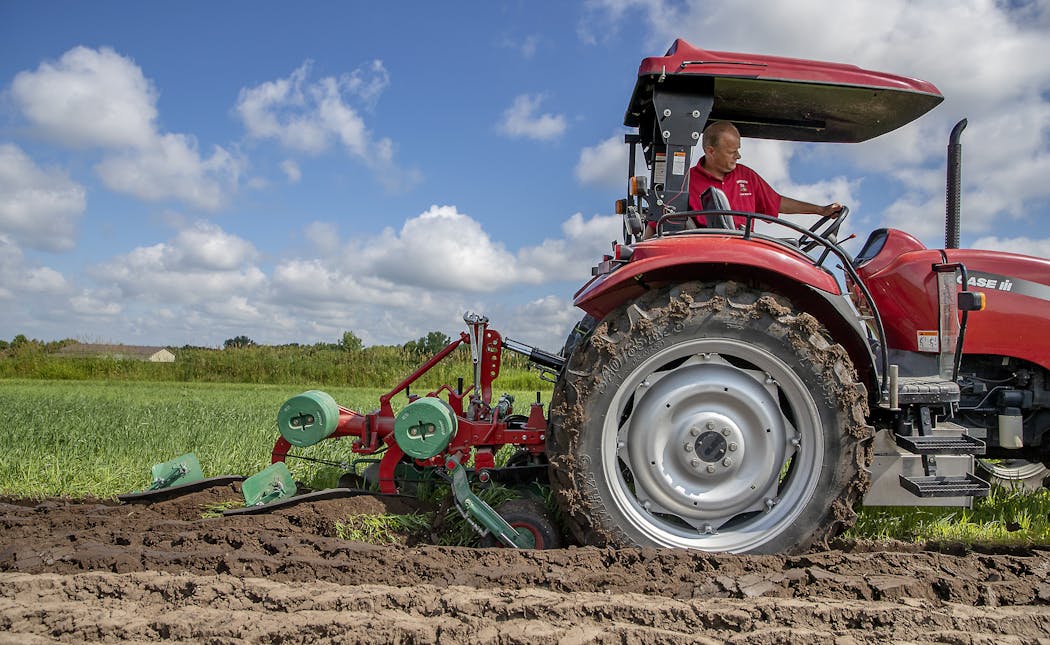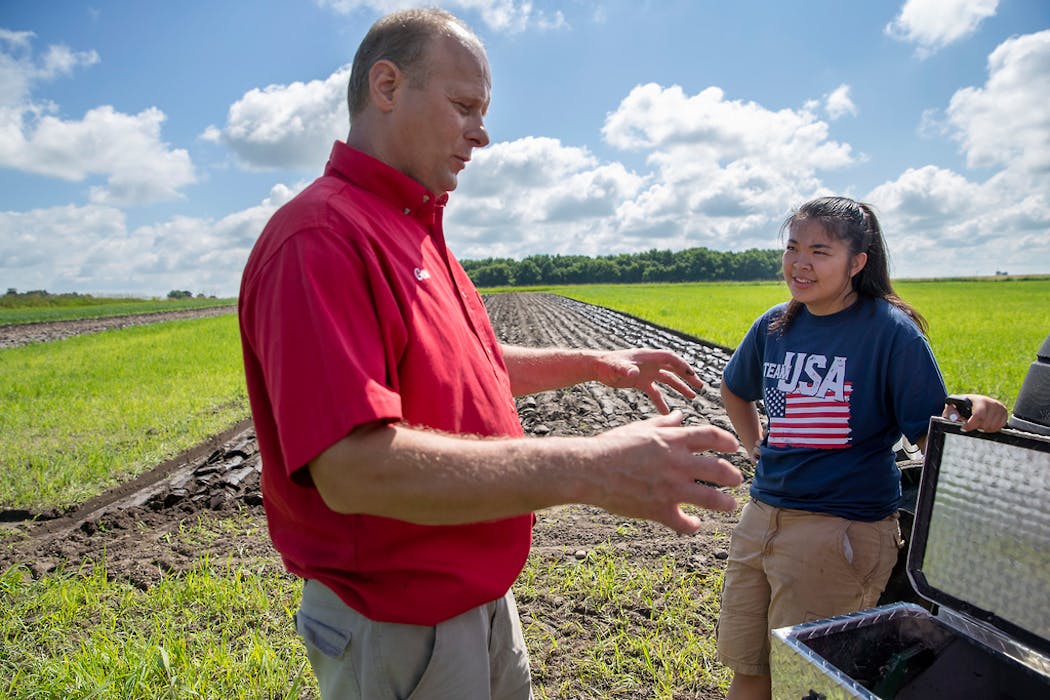Richmond, Minn. – On long summer nights, Gene Gruber makes the short walk from his home outside this central Minnesota town to the 40-acre hilltop planted in grass and oats.
He studies the field, sighting down the long, straight rows. He examines the soil, noting the texture, the moisture, how it crumbles between his fingers.
It's a process he's repeated countless times over the decades — seeing what is, and envisioning what could be.
Gruber isn't raising crops. He's plowing them under.
The 51-year-old Gruber, owner of a specialty welding shop, is the only American ever to win the World Ploughing Championship. He'll be competing again this year, when the event will be held in Baudette, Minn., during Labor Day weekend.
It's the first time in more than 30 years that the world's best "plowboys," as they're called, will vie for the honors on — or in — American soil.
"What's fun about plowing is watching the dirt come up and lay over," Gruber said. "Every furrow has to be uniform and straight."
The idea, he said, is to plow so straight, and throw your furrows so neatly, that you could chase a mouse down the row and it couldn't find a place to hide.
"It's a personal challenge to try to get your plow to do things it typically won't do," Gruber added. "You can't buy the equipment, so you have to build everything."
If the Gruber clan played hockey, they'd be household names in Minnesota. Three generations of Grubers have won 19 U.S. plowing championships, starting with Gene's late father, Werner, who won four.
Gene has won eight; brothers Conrad and Henry won four and two, respectively.
Gene's daughter Hailey won the U.S. title in 2017 at age 15, then went on to the world championship last year in Germany — the first girl ever to compete in the worlds. She finished sixth.
"She's famous in Germany," her dad said with a laugh.
Hailey started riding on her dad's tractor when she was 2 years old, in a "buddy seat" he installed for her. At age 7, she got her own small tractor.
"It's something you can't force on them," Gruber said. "She came to me and said, 'Dad, when can I start to plow?' "
Gruber started plowing on the family farm in Spring Hill, another Stearns County town about 20 miles from where he lives today. His dad, Werner, is considered the godfather of American plowing (which the rest of the world calls "ploughing").
As Gruber explains it, plowing competitions have been around about as long as plows. Farmers were eager to show off their skills, to seek bragging rights among their neighbors.
And the Gruber family definitely has the right to brag.
"Gruber has to be a name that's synonymous with plowing in the United States," said Richard Pedersen of Clive, Iowa, who represents the United States on the World Ploughing Organization board of directors. "There's not another family in the world that has had a father, three sons and a granddaughter as a world competitor. Five members out of one family is absolutely phenomenal."
Werner Gruber died in May at age 83, and his son feels the loss intensely. The side of his Case JX85 tractor bears a laminated photo of his dad at work in the field, with the inscription "Forever Ploughing: Werner Gruber."
The bond of the plow
The plow may break the soil, but it binds the Gruber family. Hailey said she and her father share a connection that not many girls have with their dad.
"It's as if we're father and son," she said. "Fathers and sons have a relationship because they're boys. Here, we are both interested in something, and we can talk about it anywhere.
"It's another string you have connected to your parent, a strong bond, and it goes to my uncles and my grandfather, as well."
In fact, Gruber said, he might have retired from competitive plowing by now if not for Hailey.
"With her plowing, I feel I should continue," he said. "The relationship means everything, and as you get older, it means more."
Gruber doesn't compete against Hailey. In fact, he typically sits out the U.S. national competition every few years — partly to take a break, partly to give other competitors a better chance to win and advance to the world meet.
This year's competition will feature about 60 entrants from about 30 countries. Baudette tourism officials said they expect to draw as many as 5,000 visitors to the town of 1,000.
Gruber's wife, Eva, and his 20-year-old daughter Kaitlyn never caught the plowing bug, but they're avid cheerleaders. Both will be in Baudette for the championship.
The rules for the competition take up more than 20 pages of small type. They talk about butts and crowns, splits and scratches and other terms known only to plowers.
Competitors are judged on 12 specific criteria. But in general, what counts is the uniformity and neatness of their furrows. The soil must turn over completely, leaving no visible weeds or stubble. Furrows must be the same width and height. They can't leave wheel marks from their tractor.
In the two-day competition, Gruber will plow one plot of grass and another of crop stubble, each measuring 100 meters long and 20 meters wide, or about 328 by 66 feet — slightly more than the length of a football field and about half as wide.
A typical farmer putting in a crop would plow that land in less than half an hour. Gruber will get three hours, and he'll use every minute.
During his three-hour stint, he'll stop as many as 100 times, jumping off the tractor to check his furrows with a measuring tape. He'll make constant, minute adjustments to his plowshare, which cuts the earth; his moldboard, which shapes the furrow; his rolling coulter, which cuts the slice; and his jointer, which skims off the stubble, leaving only dirt behind.
A quarter-inch moldboard adjustment could be the difference between winning and losing.
And this is old-school plowing. Competitors cannot use GPS to navigate or employ any automatic devices to control their tractors. It's a game of precision, yes, but it's also about feeling the soil and knowing how to work it.
Fighting the adrenaline
Where Gruber is drawn to plowing for the preparation and precision, Hailey gets a charge out of the competition.
"It's the adrenaline rush you get," she said. "You're in nature. You're representing your country.
"You meet all these people, you see different ways of life."
It was the adrenaline that tripped her up in the world competition last year. A hydraulic line broke on her tractor, and she lost her focus. Even after the line was fixed, she was off her game.
"The last day, things were going wrong [with her plow setup], and I didn't take the time to stop and fix it," she said.
It's hard to think of anything that might throw off her dad. Gruber prepares intensely for each competition, studying the soil and weather patterns in whatever location it will be held. He builds plows specifically to handle whatever nature throws at him.
When he won his world title in 2017, in Kenya, he spent the winter beforehand watching videos on Kenyan plowing. Knowing the soil was volcanic ash, which sticks to steel, he built all-new equipment out of plastic.
And he won in a wipeout.
"I was in the zone," he said. "I won by an unusually large margin."
No money, just pride
There's no money in competitive plowing — in fact, Gruber spends thousands of dollars each year on equipment, supplies and travel, to say nothing of the countless hours he invests in practicing three to four times a week from spring through fall.
When Gruber won his world title, his prize was a large golden trophy in the shape of a plow, which he had to give back after a year. He did get a small replica to keep, which now resides in the well-filled trophy case in the office of his welding shop.
Gruber is optimistic about his chances this year, because he'll be able to use his own equipment. With the competition rotating among far-flung locations — recent events have been held in Croatia, New Zealand, Denmark and Ireland — he sometimes uses plows supplied to him on-site by the Norwegian manufacturer Kverneland.
As usual, Gruber has scoped out the terrain in Baudette. The soil is sandy, he said: "It will show every mistake." And conditions can vary widely based on how dry or wet the soil is.
Competitive plowing is about angles and geometry, traced out in earth. And this quiet, careful Minnesotan is a master of the exacting skills required to do it well.
If the day comes when he competes against his daughter, he won't be rattled, no matter what the outcome.
"I've been beaten by girls before," he said with a laugh. "It's OK."
John Reinan • 612-673-7402

Motormouth: Oil type not an issue

Brides trade boozy parties for wellness retreats






